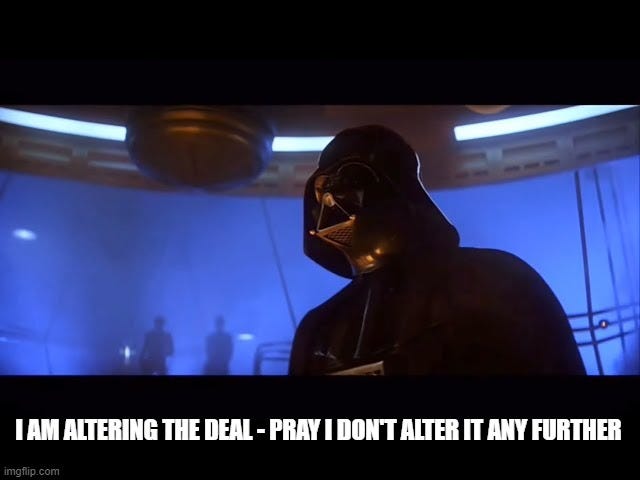You aren't upset enough about the war on hyperlinks
Our freedom to share links with our own digital communities has in many places already been taken from us. Bleaker: most say nothing about this.

Independent media, creators and a diverse amount of forums built the social media monoliths we have today. Initially, they functioned as open places of sharing ideas, and a big part of this idea-sharing included links to the open internet. Our own sites. Our friend’s sites. Sites we spent less time working on to help grow the monoliths, for free. It was a fair deal at the time to help build digital town squares, as those squares also let us share our (self-hosted) ideas. And the internet was healthy with both, for awhile.
Everything used to work symbiotically. Then, those entities unceremoniously flipped to become extractors of the web, pulled up the digital drawbridge and never looked back. And all have been made significantly worse by doing this. The best creators never fully gave themselves to the infinite, closed streams - why would they? And some of the best ideas online live outside them. It makes no sense these things are at war, they both improve each other. But people who don’t really understand what makes the internet great now are running the large internet companies. They want your attention, intellectual labor and links (to them) all for free, but will not reciprocate even just your ideas if they’re external. They’re attention roach motels (traffic goes in, it does not come out). There is no ‘focus on the user’ any longer. Users like hyperlinks, which are internet lindy and a representation of our digital freedom: sharing what we want, with our online communities - links included. Personally I’ve witnessed this happen everywhere: my own links on social are shown to increasingly fewer followers, while posts without links do fine. It’s clearly hard coded into these systems.

Platforms like LinkedIn, Facebook and Twitter/X have taken an aggressive stance against the dissemination of external content, effectively trapping users within their walled gardens. It’s really AOL all over again, just bigger and more pernicious, and the repercussions of this assault on digital culture are both far-reaching and deeply concerning. This deliberate throttling of hyperlink usage marks a profound shift in the philosophy of modern platforms and departure from the open internet ethos. At least Twitter/X cuts us a monthly revenue share check now, but even they’re still algo-killing lots of cool stuff. Also given many of us are paying customers there, we should be free to link and not algo-penalized for it.
Anyway, here’s how bad it looks today: linking out might as well be illegal on Facebook and LinkedIn, it would be about the same (given their size + algo-limiting).

What is just as extraordinary is not just the restriction itself, but the complacency with which users have accepted it. Despite the clear loss of free exchange of ideas, users continue to engage with these platforms (at increasing rates) due to the network effects they offer (trading on a previous better experience they allowed, and then flipped the script on). Not even a long time ago, such blatant censorship might have incited revolt. In some ways, we left Digg.com for less than this. But today, users seem resigned to fully surrendering their intellectual labor for free and under restrictive use.
The implications of this are bleak. By constraining the circulation of external content, large, beaurocratic monoliths exert undue influence over the information landscape, effectively curating narratives which users are exposed and the extent to which independent entities can exist. This insidious form of gatekeeping not only stifles diversity of thought but also undermines the principles upon which the internet was founded.
Moreover, the war on hyperlinks poses a significant threat to the vitality of independent creators and publishers. As platforms prioritize native content over external links, they minimize the contributions of individuals and organizations operating beyond their walls. This not only hurts the economic viability of independent media (along with the end of ZIRP) but erodes the plurality of voices that historically enriched the online discourse.
At its core, the war on hyperlinks represents a betrayal of the promise of the internet – a promise of unfettered access to information, the democratization of knowledge and not letting centralized entities have full control. Some control by some cool products was fine, perhaps desired in places to create a good experience. But large social media brands have crossed the line, and not enough people care (for similar reasons there’s widespread nihilism about other things). By relegating external content to the shadows, platforms like Facebook and LinkedIn altered the deal with users, prioritizing corporate interests over the principles of openness and transparency. It also has allowed a grifter class to flourish on these platforms (your links are bad, but stolen content and memes, those are fine, go ahead, paste them in). The incentives here are real, and not in favor of making the internet better, quite the opposite.
The good news is we do have a choice. To combat this insidious trend, users must reclaim control over their (owned) digital channels and experiences. This begins with a recognition of the value of hyperlink culture and a refusal to accept its erosion. Platforms must be held accountable, and pressure should be exerted to compel them to uphold the principles of a free and open internet. Especially since we’re paying users in many cases now. But as this still may not happen on its own, we should all be prioritizing channels of distribution like email that are platform agnostic once again. Something not much considered here: a person or company that has grown an email list and ignored social platforms they don’t own over the last 10 or 20 years is likely doing great on revenue and attention right now, agnostic to the ‘frog boiling’ ethos of big social. There’s a lesson in this.
To summarize: in the face of mounting censorship and algorithmic oppression, the fight for link freedom is more important than ever. It’s time for users to be more vocal, challenge the hegemony of walled gardens, and reclaim the promise of the internet as a democratic space for the exchange of ideas.
And maybe, just maybe, you should stop posting to the internet all the time for free. To reiterate: the deal has been altered, and it is not in your favor.




Your point about the lack of linking out leading to a lack of transparency and openness is an important one. Links are akin to citations in an academic paper. Without them, there is an echo chamber of nonsense and false information without data gets to spread.
You're right, and I hit this regularly, in Reddit groups and Facebook groups, especially. I think there's another reason: the group members and moderators themselves. It's not just the walled garden syndrome.
On Reddit, for example, I found that some groups would allow a Substack link if the topic was germane to the group's purpose. Others would just reject it, or worse yet, not respond at all.
Facebook: same thing. I have one post in the Baseball group that is just languishing, with no response at all. It IS about baseball.
There are just lazy group moderators, and anal controlling moderators. There's no discipline for them. The platform owners need to pay them a small amount, and fire them if they don't perform. Ha ha. As if that's likely.
In some cases, the members themselves just think, "Any link is likely to be spam, or malware. Reject them all."